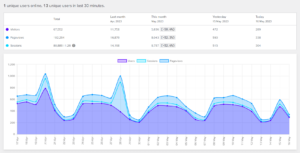I have coded three of these before, but I have finally coded and optimized the perfect one. A GitHub plugin updater for private repositories for WordPress plugins. This will work both with WordPress and ClassicPress plugins. Requires PHP 7+.
Note: This method is now discouraged, due to deprecated authentication. See how to upgrade your GitHub API authentication as recommended by GitHub.
Without further ado, here’s the updater class, updated to use the latest GitHub API authorization method.
<?php
class PDUpdater {
private $file;
private $plugin;
private $basename;
private $active;
private $username;
private $repository;
private $authorize_token;
private $github_response;
public function __construct($file) {
$this->file = $file;
add_action('admin_init', [$this, 'set_plugin_properties']);
return $this;
}
public function set_plugin_properties() {
$this->plugin = get_plugin_data($this->file);
$this->basename = plugin_basename($this->file);
$this->active = is_plugin_active($this->basename);
}
public function set_username($username) {
$this->username = $username;
}
public function set_repository($repository) {
$this->repository = $repository;
}
public function authorize($token) {
$this->authorize_token = $token;
}
private function get_repository_info() {
if (is_null($this->github_response)) {
$request_uri = sprintf('https://api.github.com/repos/%s/%s/releases', $this->username, $this->repository);
// Switch to HTTP Basic Authentication for GitHub API v3
$curl = curl_init();
curl_setopt_array($curl, [
CURLOPT_URL => $request_uri,
CURLOPT_RETURNTRANSFER => true,
CURLOPT_ENCODING => "",
CURLOPT_MAXREDIRS => 10,
CURLOPT_TIMEOUT => 0,
CURLOPT_FOLLOWLOCATION => true,
CURLOPT_HTTP_VERSION => CURL_HTTP_VERSION_1_1,
CURLOPT_CUSTOMREQUEST => "GET",
CURLOPT_HTTPHEADER => [
"Authorization: token " . $this->authorize_token,
"User-Agent: PDUpdater/1.2.3"
]
]);
$response = curl_exec($curl);
curl_close($curl);
$response = json_decode($response, true);
if (is_array($response)) {
$response = current($response);
}
if ($this->authorize_token) {
$response['zipball_url'] = add_query_arg('access_token', $this->authorize_token, $response['zipball_url']);
}
$this->github_response = $response;
}
}
public function initialize() {
add_filter('pre_set_site_transient_update_plugins', [$this, 'modify_transient'], 10, 1);
add_filter('plugins_api', [$this, 'plugin_popup'], 10, 3);
add_filter('upgrader_post_install', [$this, 'after_install'], 10, 3);
}
public function modify_transient($transient) {
if (property_exists($transient, 'checked')) {
if ($checked = $transient->checked) {
$this->get_repository_info();
$out_of_date = version_compare($this->github_response['tag_name'], $checked[$this->basename], 'gt');
if ($out_of_date) {
$new_files = $this->github_response['zipball_url'];
$slug = current(explode('/', $this->basename));
$plugin = [
'url' => $this->plugin['PluginURI'],
'slug' => $slug,
'package' => $new_files,
'new_version' => $this->github_response['tag_name']
];
$transient->response[$this->basename] = (object) $plugin;
}
}
}
return $transient;
}
public function plugin_popup($result, $action, $args) {
if ($action !== 'plugin_information') {
return false;
}
if (!empty($args->slug)) {
if ($args->slug == current(explode('/' , $this->basename))) {
$this->get_repository_info();
$plugin = [
'name' => $this->plugin['Name'],
'slug' => $this->basename,
'requires' => '5.3',
'tested' => '5.4',
'version' => $this->github_response['tag_name'],
'author' => $this->plugin['AuthorName'],
'author_profile' => $this->plugin['AuthorURI'],
'last_updated' => $this->github_response['published_at'],
'homepage' => $this->plugin['PluginURI'],
'short_description' => $this->plugin['Description'],
'sections' => [
'Description' => $this->plugin['Description'],
'Updates' => $this->github_response['body'],
],
'download_link' => $this->github_response['zipball_url']
];
return (object) $plugin;
}
}
return $result;
}
public function after_install($response, $hook_extra, $result) {
global $wp_filesystem;
$install_directory = plugin_dir_path($this->file);
$wp_filesystem->move($result['destination'], $install_directory);
$result['destination'] = $install_directory;
if ($this->active) {
activate_plugin($this->basename);
}
return $result;
}
}Then, in your main plugin file, or in your plugin’s functions file, initialize the class and pass the details. Note I am storing the access token as a license key in an option: get_option('my_licence_key'):
if ((string) get_option('my_licence_key') !== '') {
include_once plugin_dir_path(__FILE__) . '/path/to/PDUpdater.php';
$updater = new PDUpdater(__FILE__);
$updater->set_username('username-here');
$updater->set_repository('repository-name-here');
$updater->authorize(get_option('my_licence_key'));
$updater->initialize();
}And that’s it! Anytime you publish a new release with a proper SemVer version (e.g., 2.0.1), you will see an update notice in your WordPress admin dashboard.






